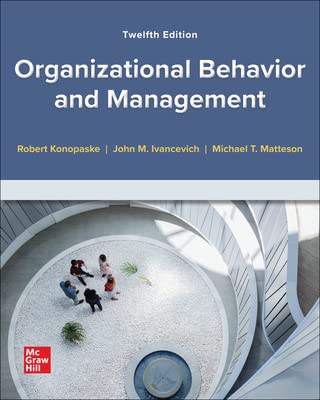Did nonverbal communications play a part in this case? Be specific and give examples. The Road to
Question:
Did nonverbal communications play a part in this case? Be specific and give examples.
"The Road to Hell" has received much acclaim as a story that provides substantial learning opportunities in examining the subtle, almost intangible dynamics of interpersonal communication between two individuals and the disastrous results that problems in interpersonal communication can produce. Upon a first reading, students are typically amazed at the outcome and ask, "What went wrong?" Answering these questions should be the objective of class discussion.
To summarize the case: John Baker, chief engineer of the Caribbean Bauxite Company Ltd. in Barracania (in the West Indies) is preparing to leave his post to accept a promotion in Canada. He has selected a native Barracanian, Matthew Rennalls, as his successor. As one of the brightest engineers on the staff, Rennalls has exceptional technical skills. He is enthusiastic and brings several other attributes to the job (along with political ties as his father is the country's minister of finance and economic planning). However, Baker worries about Rennalls' racial consciousness. He dislikes any sign of racial condescension shown by the European members of the staff and two European expatriates have complained to Baker about Rennalls' allegedly overbearing, sometimes cynical attitude.
Baker and Rennalls are friends. They socialize together and Baker gets along with Rennalls better than the other European employees. However, Baker recalls his successor's insensitivity throughout the two years of their friendship; he has sensed that an invisible barrier exists between them, created by what Baker believes is Rennalls' suppressed resentment of Europeans.
Shortly before he leaves, Baker calls Rennalls into his office to attempt to break down the barrier. Rennalls, as before, denies that he cannot get along with the Europeans on staff and assures Baker that he will correct this wrong impression. Baker tries another tack and praises Rennalls, along with Barracanians in general, for their ability to learn the ways of commerce in such a short time (50 years), compared to the European and American experience of 200-300 years. Rennalls shows no overt displeasure over Baker's remarks and, after several minutes of cheerful conversation, leaves the office.
The next morning, Rennalls has submitted his resignation, enraged over Baker's comment that Rennalls has perceived as a racial slur. In the memo, Rennalls expresses his true (and hostile) opinion of Europeans. Baker has lost his successor and the company one of its best employees.
In guiding class discussion, it's useful to focus on the question of "what went wrong?" by having students:
1. Identify the barriers of communication present in the situation. Several are at work, including:
a. Differing points of reference—probably the major barrier. Students should understand each individual's frame of reference (which may be facilitated by approaching the situation from Rennalls' and Baker's individual perspectives).
b. Selective perception.
c. Value judgments.
d. Status differences—this factor substantially accounts for Rennalls "facade" presented in communications with Baker.
e. Filtering—ask students to consider whether Rennalls is filtering communications to Baker and if so, in what way.
2. Consider the question: Was Baker's second attempt to break through the invisible barrier between himself and Rennalls a wise move? What other approaches may have been more effective?
3. Place them in Baker's position. What should Baker do? Should he attempt to convince Rennalls that his feelings toward his European coworkers, now revealed, is a critical shortcoming? Others will argue Rennalls' talents merit an effort to get him back. What actions should Baker take to secure Rennalls' return?
4. What are the cross-cultural implications of the situation? What in the chapter would help you address them?
Step by Step Answer:

Organizational Behavior And Management
ISBN: 9781265280741
12th Edition
Authors: Robert Konopaske , John Ivancevich , Michael Matteson





